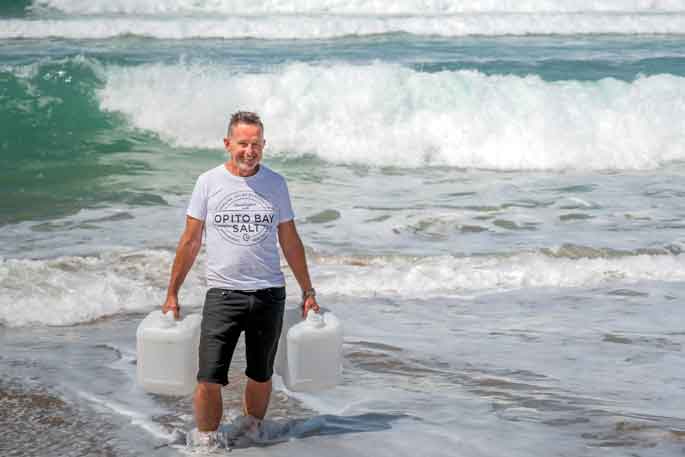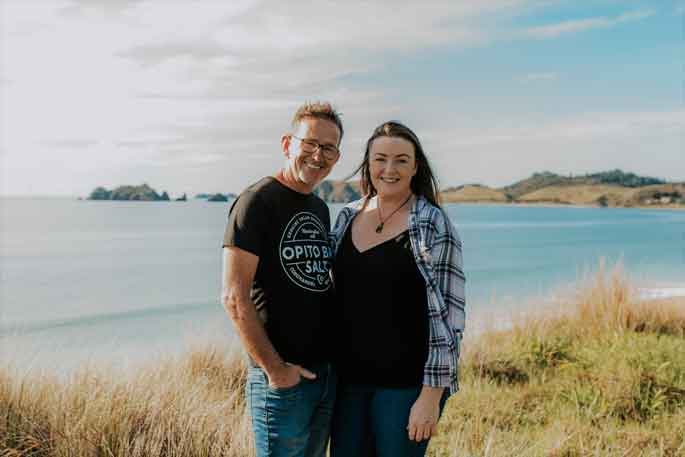It’s a story we all love to read – a couple moves away from their stressful, corporate, city life and finds peace and purpose in their new rural life.
Coromandel’s Opito Bay residents Perry Cornish and Erin Mone have done exactly that and are now immersed in their own “farming” venture, collecting seawater to make the first 100 per cent natural Coromandel sea salt and flavoured artisan salts.
Perry Cornish was brought up in Hawke’s Bay on a property adjoining orchards and is the son of well-known butcher, charcutier and chef, the late John Cornish. He describes his childhood as “full of hunting, game and good food”.
“I actually went to Massey and studied Ag Science, but I ended up working in marketing and advertising,” says Perry.
After many years travelling and working all over Europe, Perry returned to New Zealand and into the fast-paced world of finance.
Erin Mone came to New Zealand and entered the world of finance where she met Perry in 2017.
Opito Bay
Perry has owned a bach in Opito Bay for many years and has always used the remote property to escape to and relax, and Erin also fell in love with the bay.
“Noted as one of the top three beaches in New Zealand, it’s pristine, stunningly beautiful and a fisherman’s dream.”
Like all good business ideas, Perry and Erin’s was hatched over a bottle of wine one cold, wet, winter night in Grey Lynn.
“Erin was enthusing over some artisan salt she had bought, and it led to more wine, a pen and a piece of paper, and dreaming of throwing in our corporate jobs, moving to the bach and making salt!”
Inspired by their idea, for a year the couple experimented in a minor way, putting seawater in pans and under cloches at the Opito property with varied success. Undeterred they went ahead with their plan.
The move
In early-2020, as the world was dramatically changing around them, Perry had moved all his belongings to Opito and Erin’s arrival coincided with the impending March 2020 Covid-19 lockdown.
“The days leading up to the lockdown were crazy.
“We did up to four trips a day from Auckland to Opito to get all Erin’s gear to the bach before it started.”
The lockdown gave the couple time to set up and take stock. They ordered and built their first greenhouse and concentrated on their venture.
“By New Year 2021, we advertised what we were doing on Facebook locally and received a good response. We came to an agreement with a friendly local landowner and ordered more greenhouses.”
Going into production required gaining the relevant permits. Waikato Regional Council and Thames Coromandel District Council both had regulations that had to be met. These include regular testing of the water quality, using food grade components throughout the process and relevant licences obtained to produce salt commercially.
The beach water is filtered, then micro-filtrated into the salt pans in the greenhouses.
“The perfect temperature for salt formation is 65 degrees Celsius, which is very hot. We rely completely on solar power to evaporate our sea water and don’t boil it to achieve evaporation.”
 Perry Cornish collecting sea water at Coromandel’s Opito Bay.
Perry Cornish collecting sea water at Coromandel’s Opito Bay.
This means a highly mineralised salt forms in the pans which Perry says has a very unique flavour.
He’s finally using his Ag Science degree.
“We are in contact with around 50 sea salt producers across the world and regularly buy and taste other sea salts. Chemical analysis proves that it’s the minerals that create the flavour.
“Ours is six per cent mineral content compared to a normal one per cent mineral content.”
Where possible, Perry and Erin work with local growers who produce spray-free, sustainable ingredients to make their flavoured salts. Selling their products at local farmer’s markets is an important part of connecting with all their customers.
Weather dependent
The whole venture is very dependent on the elements. Opito Bay has one of the highest recorded hours of sun in New Zealand. Tides, rain and cloudy weather also affect the speed of production.
Events such as Cyclone Gabrielle affect water quality and samples are taken multiple times a year to monitor this.
Sustainability, both within the environment and the impact of their business is taken seriously with regard to recycling, well thought out packaging, minimising use of carbon-based fuels, not compromising productive farmland and returning their main by-product, pure water, back to the environment.
“Living remotely, you really focus on waste and 100 per cent of our organic waste is composted, 50 per cent of paper waste is composted, and 50 per cent recycled.”
Perry and Erin are proud volunteers with a group on the bay called The Sustainable Coastlines Charitable Trust. They participate in local dune weeding and planting at Opito to mitigate erosion and climate change impact.
This protects the environment of beautiful Opito Bay for everyone.



0 comments
Leave a Comment
You must be logged in to make a comment.